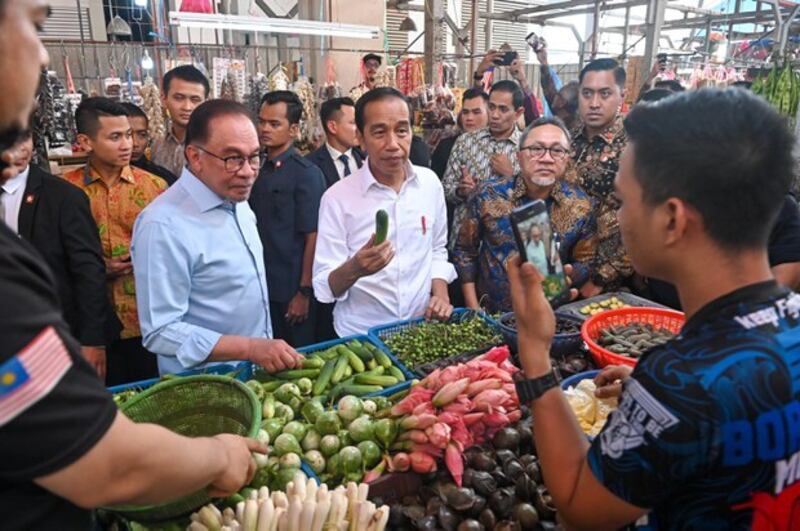Indonesian police said Friday they had arrested eight people suspected of trying to smuggle 123 workers to Malaysia, amid a rise in human trafficking cases where syndicates prey on citizens seeking jobs overseas.
The news came a day after the Indonesian president and his Malaysian counterpart met in Kuala Lumpur and discussed protections for Indonesian migrant workers, among other issues.
The Indonesian workers were rescued on Tuesday and Wednesday from two ships in Nunukan, a border town in the Indonesian section of Borneo, said Asep Edi Suheri, the head of a special task force on human trafficking.
The victims, from various parts of Indonesia, were lured by promises of jobs as domestic workers, plantation workers, drivers, sailors and other occupations in Malaysia. But they did not have the proper papers or protections required by Indonesian law for overseas workers, officials said.
“Some of them only had identity cards and no passports or visas,” Suheri said. Officers seized 22 cellphones, 54 identity cards and 45 passports as evidence from the suspects and the victims, he added.
Police were looking for two additional suspects who are believed to be in Malaysia, Suheri said. The suspects face charges of violating the laws on human trafficking and protections for migrant workers that carry penalties of up to 15 years in prison.
Indonesia is one of the world’s largest source countries for migrant workers, with an estimated 9 million citizens working abroad in 2017, according to the World Bank. Only about 4.7 million of these workers are officially registered by the labor protection agency, leaving the rest vulnerable to exploitation by illegal syndicates.
Most of the Indonesian migrants are women who work in low-wage sectors such as domestic work and manufacturing. They mainly go to Malaysia, Saudi Arabia, Singapore, Hong Kong and Taiwan.
‘Letting the big fish get away’
Indonesian President Joko “Jokowi” Widodo and Malaysian Prime Minister Anwar Ibrahim, during their talks in Kuala Lumpur on Thursday, “agreed to establish a special bilateral mechanism to resolve problems of Indonesian migrant workers,” the former said.
This week’s arrests occurred amid a rise in human trafficking cases in Southeast Asia involving hundreds of Indonesians trapped in online scams. They fell victim to human trafficking syndicates that operate across the region and exploit porous borders and lax law enforcement.
In May, 46 Indonesian migrant workers returned home after being ensnared in Myanmar and the Philippines and forced to work for online fraud companies.

Late last month, Jokowi ordered a crackdown on human trafficking syndicates after the Migrant Workers Protection Agency (BP2MI) reported that an average of two nationals had died every day of various causes during the past three years.
Some 3,600 others have returned home suffering from depression, memory loss or physical disabilities after being sent abroad illegally, during the same period.
Agency chairman Benny Rhamdani said BP2MI had handled 94,000 Indonesian migrant workers who were deported from the Middle East and Asia since 2020, and 90% of them had left Indonesia via illicit means.
Netty Prasetiyani, a lawmaker from the labor and health commission, praised the police for stopping the Indonesian workers from boarding a ferry to Malaysia.
She said Nunukan, in North Kalimantan province, was one of the main gateways for illegal migrant workers to Malaysia, where they often end up working in palm oil plantations or as domestic helpers without proper documents or protection.
“This is a complex problem that requires serious attention from the government and not half-hearted measures. It’s not enough to just stop them from leaving, but also to eradicate the root causes,” she said in a statement Friday.
Human trafficking syndicates are networks of domestic and foreign criminals who exploit the high demand for cheap labor in Malaysia and the desperation of many Indonesians who seek jobs abroad despite the risks, she said.
Anis Hidayah, a commissioner at the National Commission on Human Rights, commended the police for arresting several suspects, but said they should not stop at low-level perpetrators.
She said human trafficking was not only a crime committed by street-level recruiters but by others, including middlemen and state officials.
“The police should expose who is really behind this, whether they are law enforcement officials or government members who are part of the trafficking ring,” she said.
“This is crucial to expose because the police have always only gone after the low-level offenders, letting the big fish get away with their crimes.”
